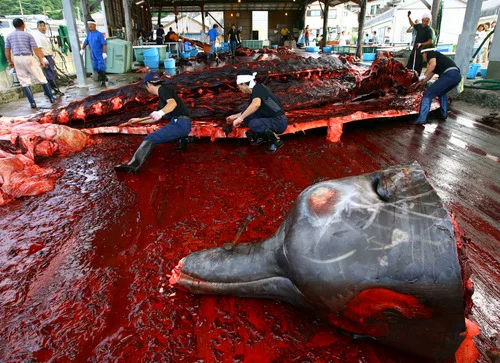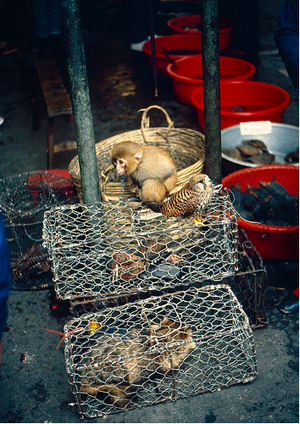When the Menu Calls for Whale Meat or Monkey Brains, Count Me Out
/Lemurs aren’t the only ‘green beings’ served in upscale restaurants around the world.
Today’s Atlantic Food Channel features David Nakamura’s “I Ate Whale Meat”. Nakamura shares the fact that most Japanese don’t eat whale, and that the determination to continue eating the meat comes from the ‘old guard’, who refuse to be pushed around by the Americans.
The Aussies and New Zealanders are ‘good guys’, but they’re not prevailing on the issue either.
Most Japanese young people either haven’t eaten whale meat or don’t care to. The whaling industry is trying to stimulate demand, serving whale meat in school lunches.
Admitting mixed financial results and cost concerns, the Institute for Cetacean Research, the organization behind Japan’s whaling program and Kyodo Senpaku, which operates the whaling fleet, announced last winter that they were closing their restaurant Yushin.
As a Japanese whale addendum, David Nakamura’s interview subject says that it was the Americans who encouraged Japanese to eat whale meat for protein, in the rebuilding years after World War II. Even if true — the world has gotten smarter since then.
I will relate my own cultural story about eating unusual animals. In all honesty, had I let the dinner proceed, I would probably be a vegetarian today. Reality is that I’m trying to eat very consciously, local, free range, little beef, etc. but I am not a vegetarian.
Monkey Brains
Years ago, I sat down to dinner in a very exclusive restaurant in China. Luckily I was with a dear colleague and friend, a South Korean man who handled me beautifully and had none of the paternalism and male superiority attitudes associated with South Korean men at the time.
In my role as head of design and product development for Victoria’s Secret, I was accustomed to honorary dinners and banquets. I’m proud to say that my popularity working in developing countries was well known. Not being one to sit in my five-star hotel room, waiting for product appear. i was always in the fire pits, so to speak.
My attitude was one of encouraging artisan skills and attitudes, paying perhaps 10% more for a product but upgrading the quality two-fold. Few such product-development partners are on the price-driven Asian circuit, where knock-offs prevail.
I have an adventurous, Cultural Creative taste for food and exotic experiences, trying as well to acknowledge and honor international customs different from my own.
This night in China, we sat down to a table for four people. I don’t remember all the particulars — Max told our hosts that I ate almost anything — snake soup, no problem (don’t yell at me; what’s the difference between snake meat and chicken?). At about the same moment our hosts explained their food choices to me, I asked about the hole in the middle of the table.
Excitedly, they told me that it was for the monkey — and we would be having one for dinner. Actually, just the brains, which are considered a great delicacy in China. I was a very important woman, so of course, we would kill a monkey on my behalf.
Simply stated, the monkey is brought alive — but inebriated — to the table; ‘secured’ with his semi-shaved head above the hole in the table. It’s my understanding that the staff smashes the monkey head in such a way to preserve the brains from too much damage. There’s an art to this act.
Then, grotesque as this vision is, one digs out the monkey’s brain with a spoon. Supposedly, the monkey brains cure impotence.
Horrified but unwilling to make a scene, I sat speechless at the table, deciding my next move. Granted, I needed these business men for Victoria’s Secret production, but they needed me even more.
Knowing that I was putting Max in a tough situation with our Chinese hosts, I decided this was all his problem, and he could blame it on me anyway, once I left the table.
“Max,” I whispered, leaning over and holding the menu in front of my face, “I am about to ask the location of the ladies room. When I leave the table, you explain that under no circumstances, will a monkey be killed in front of me — or in the kitchen — in my honor. When I return to the table, I don’t want to hear the word ‘monkey’ mentioned for the rest of the evening. Sorry, Max, but monkey brains are a ‘no go’.”
And that’s precisely what happened. The hole in the table was closed upon my return. We all were smiling; dinner was absolutely fabulous and the word ‘monkey’ was not uttered again in my presence.
Now if we could only bring the same international diplomatic solution to eating whales and dolphins in Japan, the world will take another small step forward in raising our collective culinary consciousness. Anne:
More reading
See: Let’s Hope Smart Sensuality Pink Dolphins are Smart Enough to Stay Out of Japanese Waters
When the Subject Is Women’s and Whale Rights, the Japanese Fall Far From Grace


